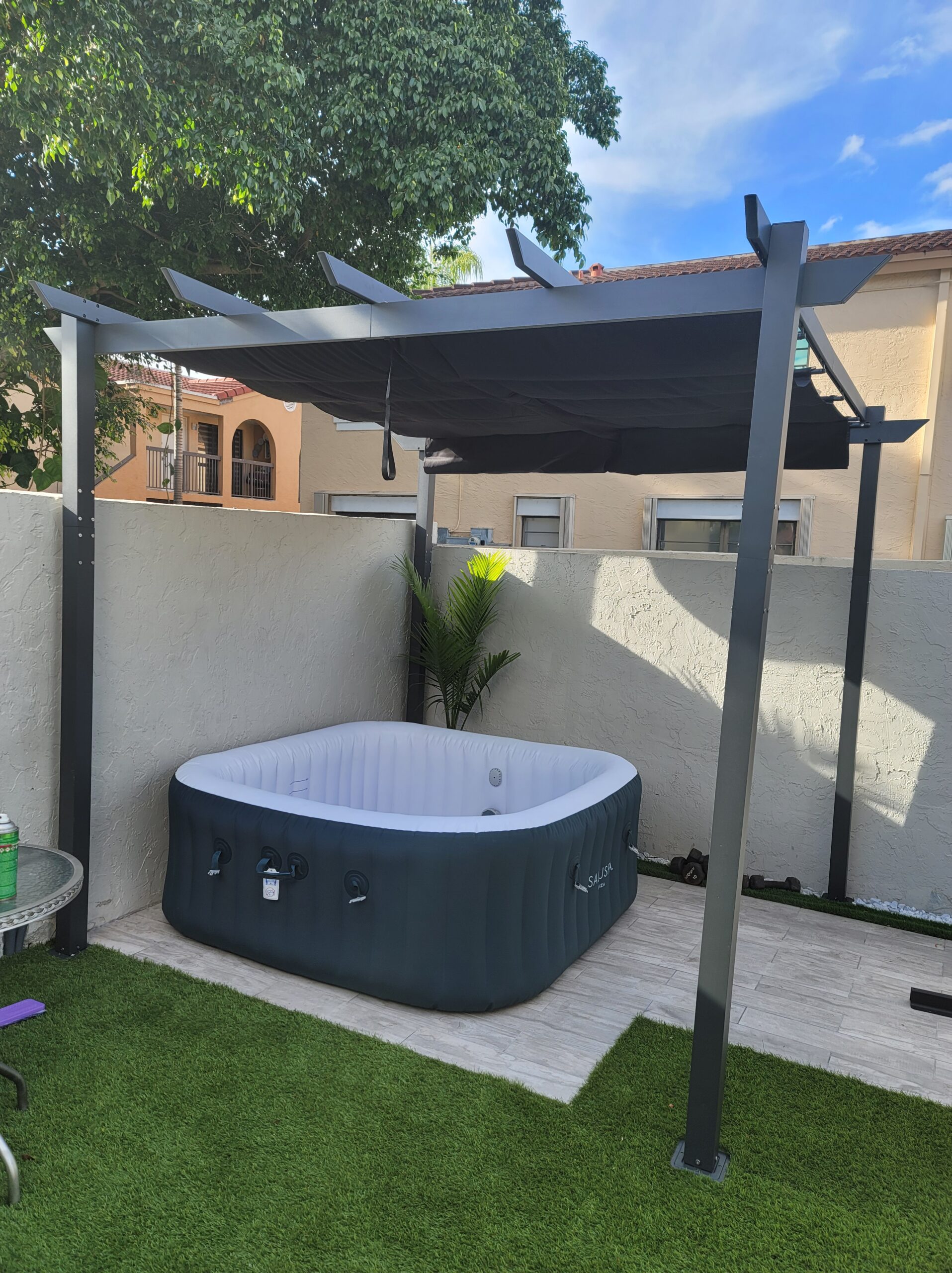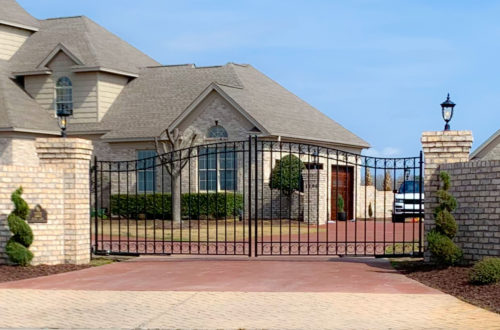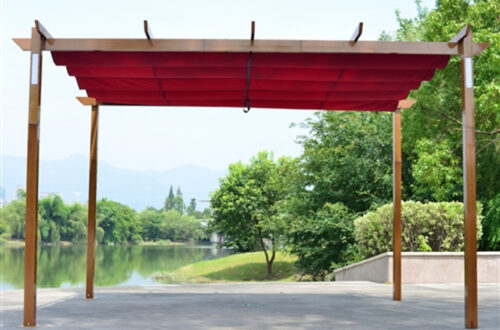One of the most popular and simple upgrades to a home’s exterior is adding a pergola. These airy, graceful structures offer partial shade, they’re an ideal framework for hanging lights and growing vines, and they add tremendous curb appeal to any home.
But before you break ground and begin the pergola installation process, there’s one all-important question to ask: Do you need a permit for a pergola?
The answer will depend on your local building codes and whether your planned pergola is a permanent structure, but it’s usually safest to assume that you do need a permit to build a pergola. In this article, we’ll give you a better understanding of whether or not you need a permit for your pergola and what steps you need to take to ensure that your project is compliant with local regulations.
How to Know if You Need a Pergola Permit
It’s easy to get carried away with the excitement of starting a new home improvement project and jump in with both feet. But before beginning any construction project on your property—DIY or otherwise—the first thing to do is learn what permits are required in your area.
To do this, you’ll need to contact your city or county building department. Simply ask them, “do I need a building permit for a pergola?” Questions about the correct permit requirements are common, so they’ll be able to provide you with an answer quickly. Don’t forget, you’ll also need to contact your homeowner’s association (if you have one).
When you contact your building department, be prepared with:
- The dimensions of your proposed pergola structure and project
- Whether the pergola will be a permanent structure
- Whether it will be freestanding or attached to your home or another existing structure
- Where it will be located on your property and how close it will be to your property line
In most cases, you will need a permit for any type of construction that alters existing structures on your property. It’s possible you’ll need a permit if your pergola will:
- Be attached to your home
- Require leveling or grading a portion of your yard
- Require modifying your home’s existing roofline
- Exceed a certain number of square feet or be over a certain height
- Be close to your property line or driveway
- Alter a historic home, neighborhood, or other area
Do you need a permit for pergolas in your area? If you want to do more research on your own before contacting your local building department, there are a few other resources that can help:
- The website of the International Code Council provides an online search tool that can help you find out if a permit is required in your area for the type of work you’re planning to do.
- Many hardware stores and home improvement stores will also offer free advice to help guide you through the permitting process.
How to Get a Pergola Permit
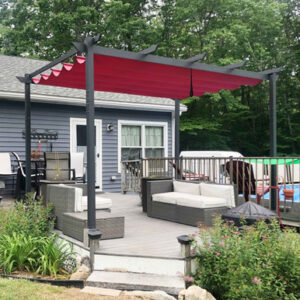
The process of obtaining a permit for a building project will vary depending on your location, but in general, it involves the following steps:
- Research local rules and regulations – In most areas, the local building codes are posted online and are publicly accessible on government websites. You can get a good idea of code requirements and whether your project requires a permit just by doing a little digging online. However, you’ll still need to contact your building department to be sure.
- Contact the building department – Talk to your local building department and provide them with the basic information about your planned home improvement. They’ll inform you whether or not you need to apply for a building permit and let you know what documentation you’ll need to provide.
- Apply for a permit – Once you’ve determined that a permit is necessary, the building department will tell you how the application process works. Generally, the application process will involve submitting building plans showing the exact dimensions of the proposed pergola to your local building department and waiting for approval.
- Schedule a site inspection – If your project is large or impactful enough to require a permit, a building inspector will also need to visit your site to approve construction. Often, the building inspector will visit once at the early stages (the “rough-in”) and once more to approve the finished project.
- Pay the permit fees – The cost of obtaining a permit can vary depending on your location and the specifics of your project. In general, the cost will include an application fee, as well as fees for inspections and other services.
- Post your permit – Once your application has been approved and the fee has been paid, you will be issued a permit that will allow you to begin construction. The permit should be posted in a visible location on the construction site.
Other Restrictions and Clearances
In addition to obtaining a permit from your city or county government, there may be other restrictions that you need to consider when building a pergola.
For example, you may need to obtain a clearance from your homeowner’s association (HOA) before building. HOAs may have their own rules and regulations regarding outdoor structures, and it’s important to ensure that your pergola complies with those rules as well.
Working with a Contractor
If your pergola will be constructed by a licensed contractor (and you should always work with a licensed contractor), they will be able to advise you on how the permit process works. Most often, your contractor will arrange the permit for you. If you arrange for the permit, your building department will consider you the party legally responsible for complying with code.
Don’t work with a contractor who suggests ignoring the permit process. Reputable contractors won’t undertake construction projects without a permit—it provides legal protection for both of you.
Why Do Pergolas Require Permits?
While it may be tempting to forgo the permit process and build your pergola without one, there are several good reasons why you should obtain a permit if needed.
- Avoiding fines and penalties – Building a structure without a permit can result in fines, which can be much more expensive than the cost of obtaining a permit in the first place. You may even be required to tear down the pergola if it can’t be brought up to code.
- Selling your home – Building without a permit can cause problems if you decide to sell your home in the future. If the buyer’s inspector finds that you have unpermitted work on your property, it could delay or even derail the sale.
- Impacting other properties – Outdoor construction projects also require permits because they can have an impact on other homes around yours. This is especially true if you plan on building your pergola close to the property line. In some cases, you might even need your neighbor’s permission to build the pergola close to their property.
- Impacting property values – Pergolas can have a positive impact on your property value, but if poorly built they can also have a negative effect on your home and others. This is especially true if the pergola is large and covers a lot of space. Especially if the pergola is large and improperly attached to your house, it could potentially decrease the value of your home and others in your neighborhood if it is not built correctly.
Obtaining a permit also ensures that your pergola is safe and up to code. Building codes are in place to ensure that structures are built to a certain standard of safety, and complying with building regulations means that your pergola will be inspected to ensure that it meets those standards.
This isn’t just red tape—it can give you peace of mind that your pergola is secure and safe for your family and guests.
When Pergolas May Not Require Permits
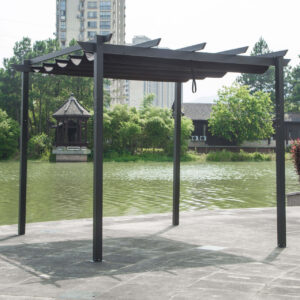
In some cases, a permit may not be required for a pergola. For example, in many localities a pergola or other outdoor structure does not require a permit if it is:
- Freestanding (not attached to the home)
- Less than 120 square feet
- Not a permanent fixture
However, keep in mind that these exceptions vary depending on your location. Always contact your local authorities to be certain you are in compliance. In general, if your pergola is attached to your home or another building, or if it exceeds certain size limits, a permit will likely be required.
Simplify Your Home Improvement Plans with ALEKO
If you’ve been asking yourself—do I need a permit for a pergola?—it’s best to contact your local building department. Obtaining a permit for your pergola may seem like a headache, but it’s vital to ensure the safety and legality of your outdoor structure. Failure to comply with local regulations can result in fines and potential legal issues.
Installing a freestanding, ready-made pergola will simplify the process, and often won’t require a permit at all—your building department will be able to let you know for certain.
At ALEKO, we understand the importance of quality outdoor fixtures. That’s why we offer a wide range of modern pergolas, pergola covers, luxury gazebos, awnings, and more that are designed to last. With rust-resistant powder-coated aluminum frames and durable fabric awnings that stand up to the elements, our pergolas are not only beautiful and functional but also safe and durable.
If you’re ready to add a new feature to your backyard retreat, contact us for products you can trust. And if you’re wondering, how much does a pergola cost? We’re here to answer those questions, too!
Sources:
NOLO. When homeowners must obtain permits for home projects. https://www.nolo.com/legal-encyclopedia/home-improvement/when-homeowners-must-obtain-permits-for-home-projects.html
The Spruce. What is a building permit? https://www.thespruce.com/what-is-a-building-permit-1398344

